A Slice of Life













When visitors were finally able to return to Life after the pandemic closures, it was an emotional moment for many of us. We were sorry to say goodbye to the NHS Vaccination Centre and were proud to have played a small part in its success story. But it was a wonderful feeling getting back to engaging with our audiences and doing what we love most. The last 12 months of continuous operation have been exciting and productive in equal measure.
We have delivered new and improved activities in the science centre through a £1.5 million investment programme. This includes ‘WOW’, an appropriate name for a set of interactive exhibits that have drawn fantastic feedback from our audiences. We have also upgraded our planetarium system so that it is truly state-of-the-art, featuring spectacular images from space in real time. Not surprisingly, space is by far the most popular topic for schools’ parties who have not only been enthralled by the new planetarium but have also taken advantage of a new suite of space-themed educational workshops. We believe that our space engagement programme is the most comprehensive of any organisation in the North of England. It’s been a real pleasure and privilege to work with the region’s academics, researchers and technologists to create such a buzzing space hub and to showcase some of the rewarding careers that the space sector offers to young people in the area.
It was a proud moment when our work with underrepresented communities was recognised by 1500 peers in the field, gathering in Germany for the annual European science centre conference. The prestigious Mariano Gago Award - equivalent to an Oscar in the world of science engagement - celebrated our partnership with the North East Autism Society, which has gone from strength to strength over the last few years. And, in March of this year, it was wonderful to receive gold for the most accessible and inclusive tourist venue at the North East Tourism awards. It was humbling and uplifting to see our work and that of our partners honoured in this way.
We remain acutely aware that the Life Science Centre is part of something very special. The bringing together of over 500 people from different disciplines on one city centre site was unusual in 2000 and it remains so today. The clinicians, researchers, educationalists, and entrepreneurs who work on site might have different jobs, but they are all united in a quest to help people live better and healthier lives and to help them understand more about the world they live in - a world that is being shaped increasingly by the rapid pace of change in science and technology. You can read more about the cutting-edge work undertaken by our long term partners, Newcastle University and the NHS in this review.

Such rapid change, of course, brings both challenges and opportunities - how can the potential of Artificial Intelligence be harnessed safely and effectively? How can Life help young people take a scientific, evidence-based approach when facing information from so many sources? What can we do to avoid the ‘tipping point’ and save our planet? These, and many other similar questions, will occupy us in the months and years ahead as the pace of change accelerates even further. We are ready to rise to the challenge.
Finally, we would both like to offer huge thanks to the Life board of trustees, the Life team, and all our partners. Collectively, we make the Life success story an enduring one.
Fiona Cruickshank Chair Linda Conlon Chief Executive
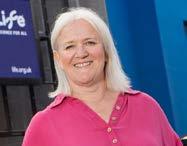
103,600
People escaped planet Earth in the planetarium

45,000
People took part in the summer Lightyear programme

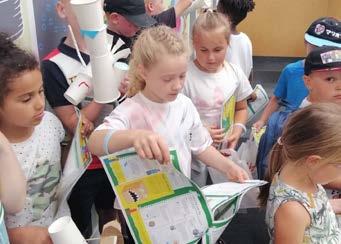
120,000
People attended events on Times Square
22,500
School pupils experienced a workshop or centre visit

46,000 Nearly
People enjoyed the Summer Saver and Festive Fiver offers
47,500
Visitors made something remarkable in the Making Studios
40,000
Visitors experienced a live science show
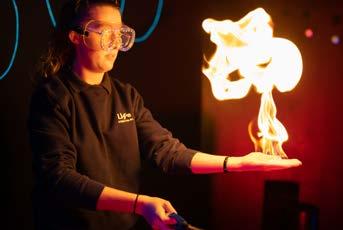
2350
Young people benefited from the Holiday Activity Fund and Life partnership
1250
People with sensory challenges have attended Relaxed Sunday Sessions


2990
Toddlers, babies (and their carers) enjoyed pre-school days



38,250
Skaters glided on the outdoor ice rink in Times Square
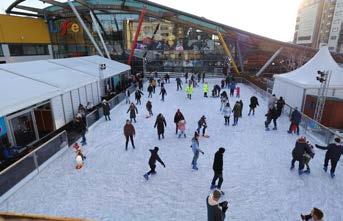

Life is passionate about delivering exciting, engaging science experiences for all ages - all year round. As well as permanent new exhibits and technological advancements, the Life team developed and delivered a number of themed activities during the year – ensuring a changing programme of experiences.
Programme Highlights
Visitors explored animal habitats across the globe. Activities included a film in the planetarium exploring the world beneath the ice and making a “bug hotel” to give shelter to bees, ladybirds and other creatures.
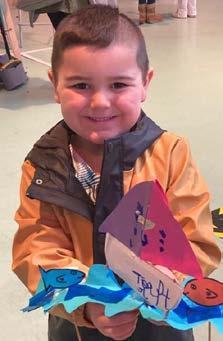
Life’s summer offer 2022 capitalised on the launch of the new blockbuster movie ‘Lightyear’ and was supported by Disney. Highlights of the programme included a new presenter-led planetarium show that explored gravity.
All things scientific and spooky were celebrated, with ‘Make a Crankenstein monster’ and demos that challenged (or tricked the senses).

The festive period featured activities inspired by light and included a new live science show which evoked a cosy, fireside theme, using storytelling techniques exploring the myths and science of things that glow.

For Spring 2023, visitors explored science secrets of the North East coast in a new live show, investigated the ways that salinity of water can affect its physical properties, and made automata of rolling waves.

The cost-of-living crisis remained a challenge throughout the year and in response, Life introduced two major offers.
The programme for the under 5s returned in September and each event was a sell-out. Young children immersed themselves in handson play and collaborative experiments, including indoor den building, animal encounters, and a baby-and-toddler friendly planetarium show. 2990 toddlers, babies (and their carers) took part.
The Summer Saver offer ran throughout the school summer holidays (buy one –three visits) and the Festive Fiver offer ran from November to January 2023.
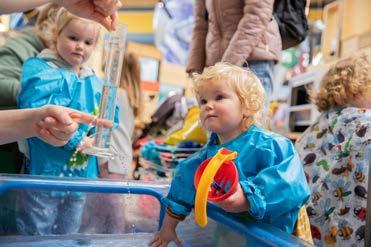
All science centre tickets over the Christmas period were £5.00 each

In February 2023, the new Wow Zone opened, full of hands-on exhibits that showcase science’s influence in everyday life. Highlights include a Big Machine stacked with levers and pulleys. Northeast connections include an exhibit where lightning bolts strike a mini replica of Newcastle’s famous Grey’s Monument.

Digistar 7 technology, so visitors can enjoy ultra-rich, high-resolution visuals and amazing sound for a completely immersive experience. One of the first showcases of this new technology was a show revealing the first phenomenal images from the James Webb Space Telescope in July. The team also developed a range of in house shows which take engagement and interactivity to a new level, including the summer hit ‘Falling with Style’ to coincide with the buzz lightyear programme.
Life’s Science Speakeasy events, in which important and often controversial topics are debated in a quirky and irreverent way, continued to draw crowds and comment.
Topics in the past year included ‘Who Owns Space?’, ‘Is Climate fiction doing more harm than good?’ and ‘Artificial Stupidity’ with panellists as diverse as an Extragalactic Astronomy researcher, ex Marvel scriptwriter and a research fellow in the ethics of robotics.
Media coverage included interviews on BBC Radio – including the Lauren Laverne Breakfast Show on 6 Music, which attracts 2.53 million listeners every week.
The planetarium continued to be a highlight for adults with a Festive Winter Skies special planetarium show providing a welcome alternative Christmas party


The new ScienceNow! Hub launched in November spotlighting cutting-edge research taking place in the region, and exploring contemporary science issues through interactive activities and demonstrations.
The first showcase, Buzzing about Bees, considered the effect humans are having on bee populations and what we can do to help. Bees provided the hook for activities with local schools during British Science Week.

A great way to make science accessible and relevant is to introduce visitors to real-life experts who lift the lid on their work, interests and passions. Highlights included ‘takeover days’ focussing on anatomy, dentistry and Alzheimer’s. Experts from the region’s universities and Alzheimer’s uk did demonstrations and dissections and used virtual reality to explore their specialisms with visitors.
To mark Alzheimer’s Day, Life worked with Alzheimer’s UK to bring a family inclusive angle to this contemporary, complex topic.
The collaboration involved four regional universities, and visitors tried activities such as investigating real brain samples.
55 staff and students from Newcastle and Sunderland Universities joined visitors to carry out dissections, ultrasound scans and building the muscle constructions of the face with playdough.

To celebrate the 125th anniversary of the Newcastle Dental School, Life worked with them to recreate activities including a Victorian dentist and storytelling in the planetarium.
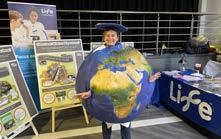

Life continued to offer interactive STEM experiences to schools, all of which are curriculum linked and delivered in fully equipped labs, 22,500 pupils enjoyed a visit to life during the year, travelling from as far afield as Edinburgh, London and Ireland.
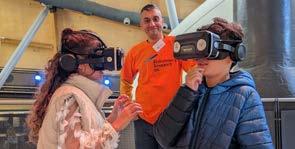
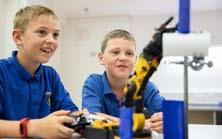
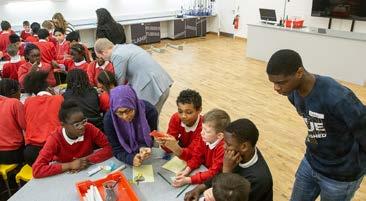
We even welcomed a school from the Netherlands who took part in our flagship PCR workshop programme!
Space continues to be the most popular topic by far with Destination Space for Key stage 2, being delivered to nearly 3000 pupils.
In July, Life took part in the three-day STEMFest NETZero event featuring nearly 800 young people from the region’s primary and secondary schools.


Using Edina Trust funding, Life held funded visits for 34 classes of 9–to 11-year-olds over the summer term, featuring “I’m a Scientist” online live chat sessions with professionals working in STEM careers.

Working in partnership with the Advanced Maths Support Programme, Life ran its latest maths-themed Mathsplosion day in November. Over 90 Year 10 students took part in.
Pupils from Barnwell Academy in Houghton le Spring and Central Walker Church of England Primary School in Newcastle collaborated with the Life team to create an urban bee garden during British Science Week in March 2023.
Teacher feedback survey
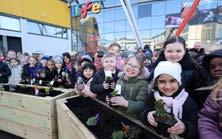
The resources available were excellent – things we just can’t afford in a primary school setting.

Life received one of just two international Mariano Gago Awards, in recognition of its innovative work with autistic communities. The awards are seen as the ‘Oscars’ of the science communication world, and are run by Ecsite, a network of over 320 science centres and museums across Europe.

This is a remarkable project that has touched our hearts as well as our heads. We were particularly impressed by the huge personal impact that the Life project has made for participants. It has strong stable foundations and a legacy going forward.”
Sharon Ament, Director of the Museum of London and Chair
In the past year, Life has continued to build and nurture relationships with under-represented communities to ensure that the science centre is a welcoming place for everyone and our achievements in this area have been acknowledged internationally see page 10 for all the details.
In June 2022, monthly “Relaxed Sunday” sessions were re-launched, offering an opportunity for autistic people and those with other sensory needs, to access and enjoy the science centre in a more calm, relaxed environment.
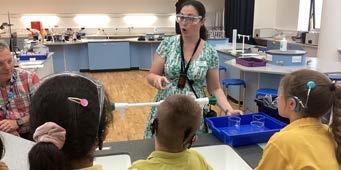

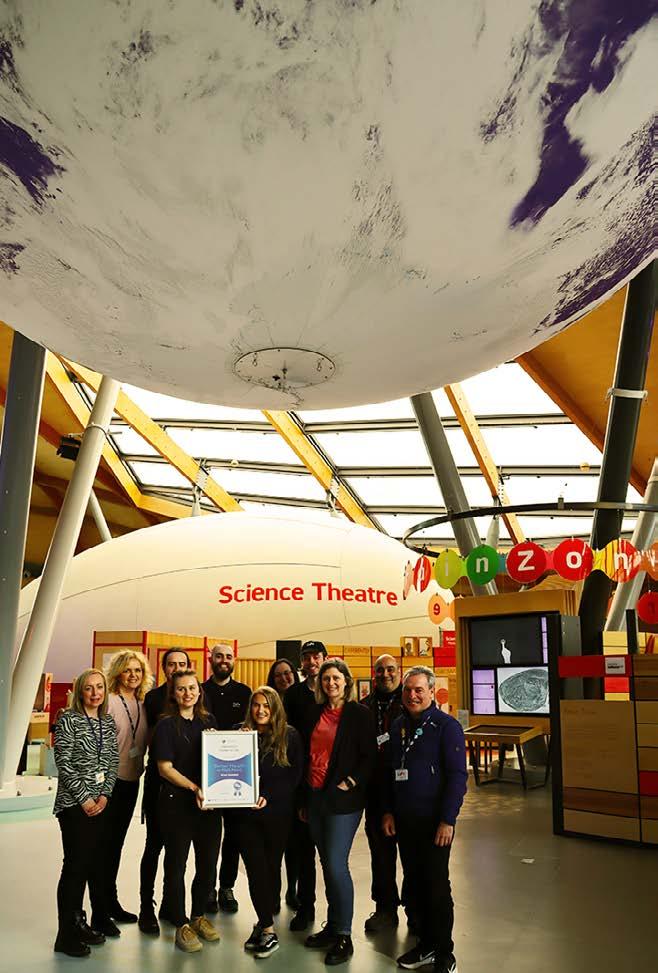
Life has also received…
The VisitEngland Visitor Attraction seal of approval (one of less than 100 attractions nationwide to obtain it!)
A Silver Better Health at Work Award for its efforts to promote positive mental health and self-care awareness.
Deaf-friendly Accreditation from The National Deaf Children’s Society.
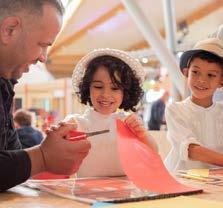
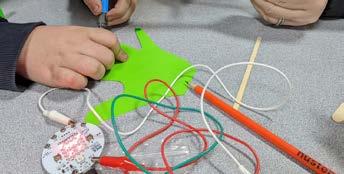
The Deaf Science Club ran throughout February and July, benefitting children from Newcastle schools with Hearing Impairment Additionally Resourced Provision. The Life team learned British Sign Language to facilitate the sessions.
The Community Pass Scheme helps bring targeted groups to the centre for free. In the past year, nearly 500 people visited. Groups included African Community Advice North East (ACANE), Reviving the Heart of the West End, and North East Sight Matters, and for the first time, groups from: The Angelou Centre, A Cup of Parenting and the Inner West Partnership. Delivered in partnership with Local Authorities, the Holiday Activity Fund helps open venues such as Life to many young people and families. In the past year, nearly 2500 experienced a day in the science centre and received a hot nutritious meal.
Connect is a family engagement project, funded by the North of the Tyne Combined Authority and delivered by a partnership of NUSTEM (Northumbria University) and Life. These playful workshops aim to increase an understanding of the digital world by making cardboard puppets that move in response to digital inputs.
Life is a charity, built on an entrepreneurial business model that ensures all of the income needed to meet operating costs is self-generated. Times Square, the outdoor space at the heart of the science village, provides a vital revenue stream through external rentals.


Run by the Life team, the rink has become Festive favourite with 38,000 people enjoying a skating experience this year.
Life’s on-site partners continue to do life-enhancing work, both in research and clinical care. The Life site is home to 30 research groups and more than 200 research, diagnostic laboratory and clinical staff, working for organisations such as Newcastle University, the NHS Northern Genetics Service, and the NHS Newcastle Fertility Centre.
Here are just a few highlights from the past year:
• Funding was secured for a new research unit for organ donation and transplantation that will be hosted in Newcastle for the next five years. This unit will include a new laboratory at Life, which will explore treatments for donated organs before they’re transplanted.
• Researchers in Vascular Biology and Medicine are investigating the body’s ability to repair tissue after a cardiac injury, which could lead to new treatments for

Gave thousands of fans the opportunity to cheer on England during the 2022 tournament.
The North East’s “biggest beer garden” - known as Central Park – popped up in time for the May Bank Holiday weekend.

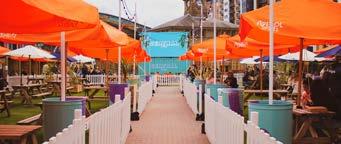
with bowel cancer and other diseases, and using RNA

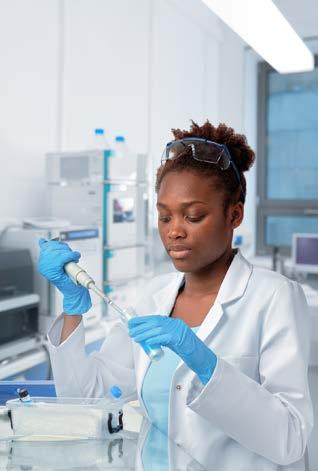
When Life opened, many people were nervous about genetics research and the concept of IVF babies. Life is proud to have been a pioneer in both fields. Partnership is key to the work we do. For example, male infertility genetics, my specialism, has involved working with fertility experts from Newcastle University and international collaborators but also closer to home, with the NHS Fertility Clinic on site. It’s inspiring and rewarding to be part of a unique circle of science in a place where researchers, clinicians, science communicators and educators work side-by-side, sharing expertise and ideas. We are all driven by a common goal to enrich lives through science - and to make it accessible and relevant to everyone.”
Newcastle celebrated Oktoberfest with authentic beers, tunes and Bratwurst in a 1200-capacity beer hall tent.
Brought their popular show back to Times Square in September and October.

• The NHS Newcastle Fertility Centre at Life is


Newcastle Fertility Centre has been part of the Life story since 1998 - two years before the site was officially opened by Queen Elizabeth II in 2000. We’re now regarded as a world-leading fertility clinic, dedicated to research, innovation and supporting our patients and we’re proud to be part of the ongoing Life story. We’ve helped thousands of people every year, as part of their fertility journey. Fertility treatment often takes place in out-of-the- way places so being part of this vibrant community, in the heart of the city, is a hugely positive thing for our patients and our team. It’s a daily reminder of the wonders of science and the power of partnerships.”
A big thank you to our Board of Trustees, who give their time and expertise to help Life achieve its mission.
Read our trustee profiles here










If you have the experience and enthusiasm to be a Trustee on our main board or a Non-Executive Director on our commercial board, read our digital trustees guide for more information.
role that Life plays in hosting both research and healthcare. We have the satisfaction of discovering exciting new ways to understand and treat genetic conditions - and seeing the real difference we make to patients. Working as part of the North East and Yorkshire Genomic Medicine Service, we make sure the latest developments in genomics benefit people across our regions. Clinicians, laboratory staff, reasearchers and our patients are working together to investigate improvements in how we diagnose many conditions including bowel cancer, harnessing RNA sequencing to help diagnose diseases when existing lab tests do not give us an explanation and exploring how to detect and treat cancers at an earlier stage. Genomics offers an opportunity to find out so much more about how to care for our bodies - and provides much optimism for better treatments and outcomes for our patients in the future.

• The John Walton
Research Centre at Life has secured funding which will help them improve the diagnosis and treatment of patients with rare muscular disorders, such as Duchenne muscular dystrophy and Pompe disease.
• Prostate Cancer Research and
Cancer UK are providing funding to a Newcastle University team to develop revolutionary new treatments for prostate cancer. The team is looking to explore new ways to stop the spread of the disease, which is the most common cancer among men. They have also developed a new blood test to diagnose the disease quicker and more accurately, which is being commercialised by a spin-out company called GlycoScore.

Life Science Centre, International Centre for Life, Times Square, Newcastle upon Tyne NE1 4EP
Telephone: 0191 243 8210 Email: info@life.org.uk Website: life.org.uk